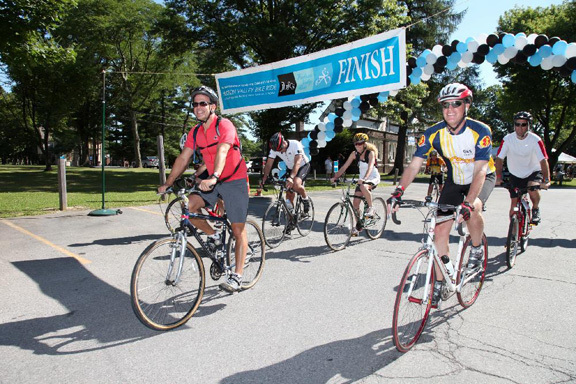Charity sues bike tour guide
You’ll hear from my lawyer
By Michael Orbach
Issue of April 8, 2010/ 24 Nissan 5770 If you’re thinking about ever running a bicycle tour, this tip can help you avoid aggravation and legal fees: avoid the word ‘Hudson.’ If you don’t, the Jewish Board of Family and Children’s Services might sue you.That was the experience of Glen Goldstein, an affable former public relations man who gave up Madison Avenue for the mountains. He organizes bicycle tours though a small business, Bike Shows US, that he operates out of his house in Monticello.
Last year he was contacted by the Jewish Board of Family and Children’s Services, known as JBFCS, to run a fundraising bike tour, their first such event. The tour, which they called “The Hudson Valley Ride,” rode through the Hudson Valley in Westchester, with a fundraising miniimum of $500 per person. Goldstein, who is Jewish, was so taken with the charity that he says he donated $500 of his own.
A year passed and Goldstein didn’t hear back from JBFCS but wasn’t too bothered by it.
“Usually when I do a ride for someone else you do it for one year,” he explained. “They learn all of your tricks and you’re done. That’s completely fair.”
Having sponsored one biking event, JBFCS was invited to the Bike Summit, online dialog where various bike tours coordinate their schedules, so as to not interfere with one another, but the JBFCS did not attend, according to Goldstein.
Goldstein set up his own ride along the Hudson River for the next year and called it “The Hudson River Ride.”
The day after the regional calendar of bicycle tours was published, the trouble began. Goldstein received a call from the new JBFCS president, Tony Mann.
“He [started] screaming at me,” Goldstein related. “He says we stole his ride.”
It turned out that the date of Goldstein’s ride was the same date the JBFCS had chosen for its second annual charity bike ride.
Goldstein sent a letter to Mann describing why he chose the date, based on the Jewish holidays and of the other rides he was organizing throughout the summer. At $79 a head and 50 miles from the JBFCS site, Goldstein felt that the rides were not competitors. At the top of his own webpage he added a link to the site of the JBFCS ride and a suggestion that riders join the JBFCS tour because it is “a great event for a great cause.”
It was to no avail because days later Goldstein received a letter from attorneys representing JBFCS that accused him of “trademark infringement, unfair competition and deceptive business practices in violation of federal and state laws.”
What followed was a lengthy settlement discussion during which the JBFCS attorneys sought to ban Goldstein from ever again using the word “Hudson” in his rides.
Goldstein thought about fighting it out in court, but given his $35,000 yearly income, the prospect was daunting, he said.
“The judges are going to say you can’t copyright the word of ‘Hudson,’ but my legal bills will be to $10,000 to $20,000. They can appeal again and I’m going to spend another $10,000 to $20,000,” he explained. “If my lawyer had said $5,000 I might have been tempted.”
Three months later a bewildered Goldstein reached a settlement with the JBFCS. He changed the name of his bike tour to “Bike the River Valley” and agreed to sell the Internet domains he bought that used the word ‘Hudson.’ As part of the agreement, Goldstein was prohibited from contacting any “employee, director, trustee, agent or volunteer” affiliated with the JBFCS.
Goldstein was mystified that a charitable organization would spend money on lawyers for something that could have been handled amicably. He was hoping they worked pro-bono but said he learned that they weren’t.
“My guesstimate? They’ve already spent between $10,000 and $20,000 in legal fees,” he said. “Their lawyers aren’t free. Tony’s a good guy and JBFCS is a good charity but in the way they spend their money — this seems like a weird way.”
JBFCS did not return calls for comment. Stephen J. Quigley, an attorney with the firm of Ostrolenk Faber, that represented JBFCS, declined to comment.
Linda Hartley, presidency of Hartley Consulting, a Riverdale-based consultant to not-for-profits, said that the JBFCS reaction is becoming more common.
“I can’t say whether it’s good or bad,” she said. “This is an example of the blurring of for-profit and non-profit lines. It’s happening more with newer non-profits being founded by philanthropists coming from the business world applying some of the things they learned [in the business world]. Sometimes it works, sometimes it doesn’t.”
Since Goldstein went public with news of the settlement he has received calls from lawyers who went on his bike tours that offered to take up his case pro-bono. He has declined their offers.
Goldstein wondered if the difference in outlook stems from Mann’s background running a large electrical services company.
“I’m guessing it’s a rough business. In that business you get things done by yelling and screaming,” in contrast to the world of bicycle tours, Goldstein explained.
“The people who work my rides — it’s just when things get tense [we say] ‘It’s just a damned bike ride.’ Anything we do, it’s just a damned bike ride. That’s the way we are.”

 72.0°,
A Few Clouds
72.0°,
A Few Clouds 




